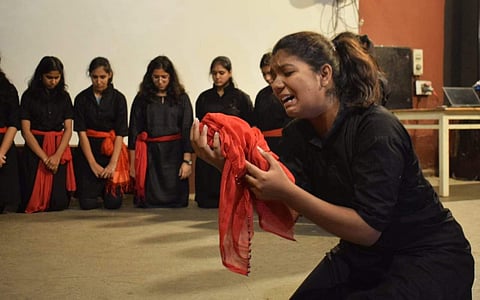

After every scene of the street play Mudda Ghatak Hai (The Matter is Critical), the actors repeat the dialogue 'Mudda ghatak hai, ghatak hai, mudda ghatak hain', and this chant reverberates throughout this play performed by Bedaari, St Francis College for Women's street play troupe. This is the first play they've performed, which they did at Lamakaan in Hyderabad on December 22, 2019, and with their very first story, they've covered sensitive topics like LGBTQIA+, prostitution, body-shaming, female infanticide and sexism. And we can tell you that it was a hit with the public because we hear that several scenes left the audience teary-eyed. And in a chat with the writer and director of the play, Nishtha Panday, we find out that they intend to put up many more thought-provoking plays in the future. "The culture of street play is not very strong in Hyderabad and we want to do something about it," she says.
While the group has performed many plays together, Bedaari was formally formed in August 2019 and they have 18 members in their team now. A version of Mudda Ghatak Hai was performed in front of the High Court last year, but the curreny 30-minute version has been infused with many more elements and layers. "I've added a Mahabharata element and female infanticide and the issue of dowry, which are still prevalent today, are some of the issues that have been added to the play," says the 19-year-old. Nishtha, a third-year Mass Communication student, wrote the play and while practising it, added a lot of other details and aspects on the go.
But the point that they wanted to convey has been constant throughout - that the society has certain stereotypes and it forces people to conform to it. "It controls us in this way, we need to break free from them," explains the youngster who was born in Jhansi, Uttar Pradesh. One of the very first scenes establishes this premise. It features a chariot with four wheels - each wheel representing a particular stigma, namely body shaming, how girls are expected to behave, a gay couple and a crying man. Society, personified as a person, comes in abusing them and commands them to listen to her. Many monologues and catchy slogans are generously sprinkled throughout the play. "When I look at them perform, all I remember is how we felt when we performed for the first time and the jitters we felt. We tend to shake it off eventually and open up," says Nishtha who asserts strongly that the play is a team effort.
Apart from performing the 'mostly-Hindi' play in front of the High Court and at Lamakaan, they performed it at the Ravindra Bharathi auditorium in Hyderabad and they have taken it to IIT Jodhpur as well. They have also performed plays like Choli Ke Peeche Kya Hain on prostitution and menstruation and a play on cyber security as well. Currently, they are working on a play on mob lynching.
What is a street play?
- It is a louder form of theatre and performed in open and public spaces
- These plays usually have a social awareness-based theme
- They hardly use any props or huge sets
- Music is performed and usually, nothing is pre-recorded
- One person plays many characters
For more on them, click on instagram.com/bedaari.sfc
